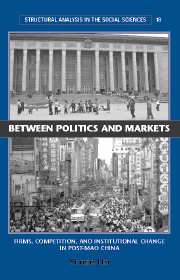Book contents
- Frontmatter
- Contents
- Tables and Figures
- Acknowledgments
- Introduction: Economic Market and Political Market
- 1 Chinese Industrial Enterprises: A Bird's-Eye View
- 2 Central Planning and Its Decline
- 3 The Rugged Terrain of Competition
- 4 Referee as Player: Menaces and Opportunities for Industrial Firms
- 5 Erosion of Authority Relations: A Tale of Two Localities
- 6 Favor Seeking and Relational Constraints
- 7 Competition, Economic Growth, and Latent Problems
- Conclusion
- Appendix A Statistical Data Sources
- Appendix B Methodological Note on Case Studies
- Bibliography
- Index
5 - Erosion of Authority Relations: A Tale of Two Localities
Published online by Cambridge University Press: 15 July 2009
- Frontmatter
- Contents
- Tables and Figures
- Acknowledgments
- Introduction: Economic Market and Political Market
- 1 Chinese Industrial Enterprises: A Bird's-Eye View
- 2 Central Planning and Its Decline
- 3 The Rugged Terrain of Competition
- 4 Referee as Player: Menaces and Opportunities for Industrial Firms
- 5 Erosion of Authority Relations: A Tale of Two Localities
- 6 Favor Seeking and Relational Constraints
- 7 Competition, Economic Growth, and Latent Problems
- Conclusion
- Appendix A Statistical Data Sources
- Appendix B Methodological Note on Case Studies
- Bibliography
- Index
Summary
To gain a clearer view of the influence of particularistic state action on the uneven pace and outcome of marketization among different firms, it is necessary to examine how the institutional settings of state action have been transformed. As noted in Chapter 3, an important change in the rules governing the behavior of state agents during the reform was administrative decentralization. This restructuring of authority relations, however, is by no means an institutional invention of the post-Mao era. In the first three decades of the PRC's history (during 1958–60, 1964–6, and 1970–5), there were a few rounds of large-scale delegation of decision-making authority from the center to local governments (Riskin 1987; Zhu Rongji 1985). A major difference between the two eras is that since the early 1980s state agents have gained increasing individual discretion in defining both the content and the scope of the agenda implemented in local jurisdictions. This change signifies serious erosion of vertical and lateral monitoring of decision making in the political process, which has been the main underpinning for maintaining the state's organizational health.
This chapter explores how traditional constraints on the self-seeking behavior of state agents have been weakened. Two cases, an urban district and a rural township, are examined. The former is indicative of the environment in which state firms operate, whereas the latter encompasses essential features of the locales where large numbers of nonstate firms, especially TVEs, have grown.
- Type
- Chapter
- Information
- Between Politics and MarketsFirms, Competition, and Institutional Change in Post-Mao China, pp. 122 - 150Publisher: Cambridge University PressPrint publication year: 2001



